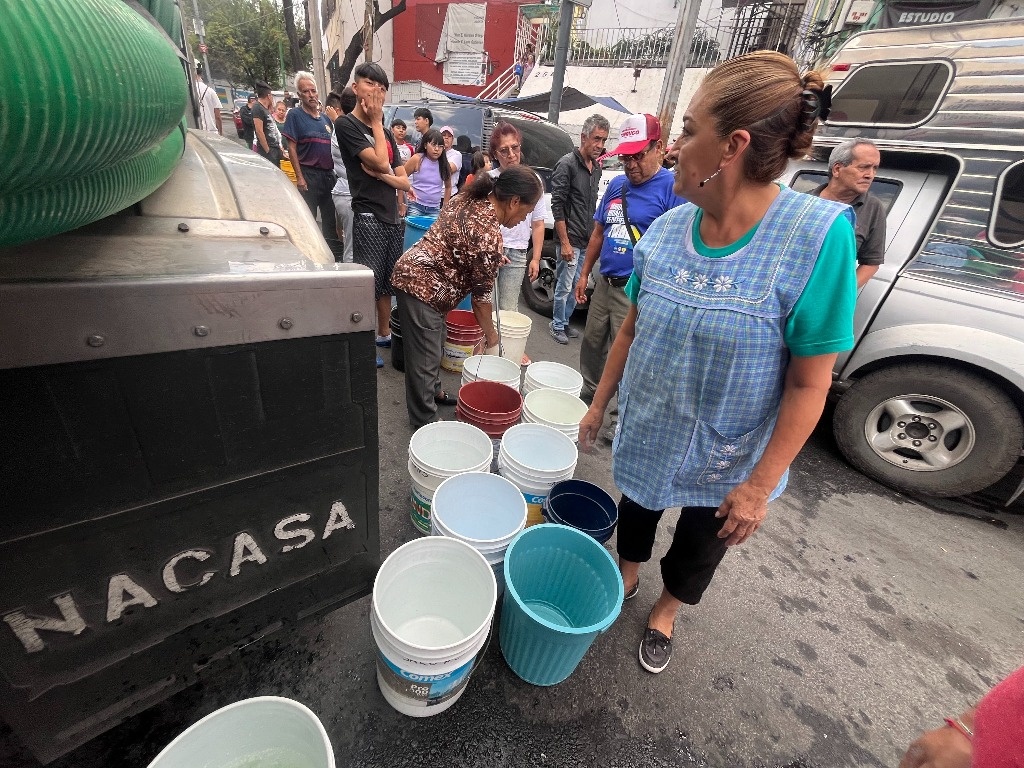In Mexico, water will no longer be seen as a commodity, said President Claudia Sheinbaum, when presenting the National Water Plan, which will have an investment of 20 billion pesos in 2025 and, as she had anticipated, The Dayconsiders that element a right and an asset of the nation.
The neoliberal vision is left behind. It had already started with President López Obrador, but we are going to give it a greater push to recover water as an asset of the nation and as a human right.
said the president.
The plan includes the organization of concessions and the goal of increasing efficiency in agricultural irrigation through the modernization of 200 thousand hectares; This will increase production by 51 percent.
The government also plans to create a master plan during the six-year term for the development of drinking water infrastructure, the sanitation of rivers and the development of 16 strategic projects.
One of the first actions is the signing of the National Agreement for the Human Right to Water and Sustainability, which will take place next Monday, November 25, with the participation of irrigation districts and units, the main industrial consumers, academic institutions and research, user communities and the government at its different levels.
Until now, industrialists and concessionaires in the countryside have committed to returning to the nation 2.5 billion cubic meters of water that they had a concession and do not use, which is equivalent to two and a half years’ supply of Mexico City. What we want is for that water that is not used to be returned to the nation so that it can be made available, because even the municipalities have the water concession. Water belongs to the nation
said the president.
The general director of Conagua, Efraín Morales López, explained that for the implementation of the National Water Plan, the federal government estimates an investment for 2025 of about 20 billion pesos for projects, such as the El Novillo dam in La Paz, Baja California. South; a desalination plant in Playas de Rosarito, in Baja California; a dam system in Hermosillo; a comprehensive plan for Acapulco and another for the metropolitan area of the Valley of Mexico.
The Tunal II dams will also be built in Durango; Milpillas, in Zacatecas; Las Escobas, in San Luis Potosí; trunk networks for the Agua Saludable project, in Durango and Coahuila; the Ciudad Victoria II aqueducts, in Tamaulipas; Solís, in León, Guanajuato; Zacualpan II, in Colima; La Cangrejera-Coatzacoalcos, in Veracruz; as well as the Paso Ancho Dam, in Oaxaca; the aquaferic, in Campeche, and flood protection works in Tabasco.
Among other measures, the government will promote reforms to the National Water Law to end speculation, as well as the issuance of the General Water Law, to defend the rights of the population in the matter.
Morales explained that the sanitation of water bodies will begin in the three most polluted rivers in the country: the Lerma-Santiago, the Atoyac and the Tula, for which Conagua will work with Semarnat, in order to eliminate polluting discharges, reforest, rehabilitate and build treatment plants and collectors, as well as the construction of wetlands.
The Secretary of the Environment, Alicia Bárcena, maintained that the plan changes the extractivist and privatizing approach that existed in previous governments.
The Secretary of Agriculture, Julio Berdegué, highlighted that the plan will boost rural productivity by 51 percent and will contribute to the nation’s food sovereignty.
!function(f,b,e,v,n,t,s)
{if(f.fbq)return;n=f.fbq=function(){n.callMethod?
n.callMethod.apply(n,arguments):n.queue.push(arguments)};
if(!f._fbq)f._fbq=n;n.push=n;n.loaded=!0;n.version=’2.0′;
n.queue=[];t=b.createElement(e);t.async=!0;
t.src=v;s=b.getElementsByTagName(e)[0];
s.parentNode.insertBefore(t,s)}(window, document,’script’,
‘
fbq(‘init’, ‘133913093805922’);
fbq(‘track’, ‘PageView’);
fbq(‘track’, ‘Contact’);
fbq(‘track’, ‘Donate’);
fbq(‘track’, ‘FindLocation’);
fbq(‘track’, ‘Lead’);
fbq(‘track’, ‘Search’);
fbq(‘track’, ‘Subscribe’, {value: ‘0.00’, currency: ‘MXN’, predicted_ltv: ‘0.00’});
fbq(‘track’, ‘ViewContent’);
#Sheinbaum #water #good #nation #commodity
–
Here are two PAA (Potential Audience Actions) related questions based on your text:
## World Today News Exclusive Interview: Reimagining Water in Mexico
**Introduction:**
Welcome to World Today News. Today, we delve into the groundbreaking National Water Plan recently unveiled by Mexican President Claudia Sheinbaum. This ambitious initiative aims to transform Mexico’s relationship with water, moving away from commodification towards recognizing it as a human right and national asset.
Joining us today are two esteemed guests:
* **Dr. Maria Fernandez**, a leading water resource economist and professor at the National Autonomous University of Mexico (UNAM).
* **Agustin Ramirez**, a prominent environmental activist and founder of the Water Justice Coalition.
**Section 1: A Paradigm Shift**
**Interviewer:** Dr. Fernandez, President Sheinbaum declared that the “neoliberal vision” regarding water is being left behind. Can you elaborate on what this signifies and what the implications might be for Mexico?
**Dr. Fernandez:** …
**(Dr. Fernandez discusses the historical context of water management in Mexico, the influence of neoliberal policies, and the potential benefits of the new approach in terms of environmental sustainability and social equity.)**
**Interviewer:** Mr. Ramirez, your organization has been advocating for water justice for many years. What are your initial impressions of the National Water Plan?
**Agustin Ramirez:** …
**(Mr Ramirez shares his organization’s perspective on the plan, highlighting both its promising aspects and areas where they hope to see more concrete actions and community involvement.)**
**Section 2: Infrastructure and Investment**
**Interviewer:** The plan outlines significant investments in infrastructure projects like dams, desalination plants, and sanitation initiatives. Dr. Fernandez, how do you assess the feasibility of these projects and their potential impact on water availability and quality?
**Dr. Fernandez:** …
**(Dr. Fernandez discusses the economic and environmental considerations of large-scale infrastructure projects, emphasizing the importance of careful planning, community consultation, and long-term sustainability.)**
**Interviewer:** Mr. Ramirez, some critics argue that these projects might disproportionately benefit industrial interests or large agricultural corporations. What safeguards are needed to ensure that the benefits of improved water infrastructure reach all segments of society, including marginalized communities?
**Agustin Ramirez:** …
**(Mr. Ramirez addresses the issue of equitable distribution of water resources and advocates for mechanisms to ensure transparency, community participation, and ethical considerations in project implementation.)**
**Section 3: Legal Framework and Public Engagement**
**Interviewer:** The government plans to introduce reforms to the National Water Law. Dr. Fernandez, what key changes are envisaged, and how will these reforms strengthen water rights and address issues like water speculation?
**Dr. Fernandez:** …
**(Dr Fernandez explains the proposed legislative changes, their potential impact on water governance, and the importance of a robust legal framework to protect water as a shared resource.)**
**Interviewer:** Mr. Ramirez, what role do you see for civil society and grassroots organizations in shaping the implementation of the National Water Plan?
**Agustin Ramirez:** …
**(Mr. Ramirez emphasizes the importance of community engagement, public awareness, and citizen monitoring to ensure that the plan is truly responsive to the needs and aspirations of the Mexican people.)**
**Conclusion:**
The National Water Plan represents a significant turning point in Mexico’s approach to water management. While challenges lie ahead, the commitment to recognizing water as a fundamental right and a national treasure provides a solid foundation for creating a more equitable and sustainable future for all Mexicans.
**Thank you to our guests for their insightful perspectives. We encourage our viewers to stay informed about the progress of the National Water Plan and to actively engage in the dialog surrounding this vital issue. **


